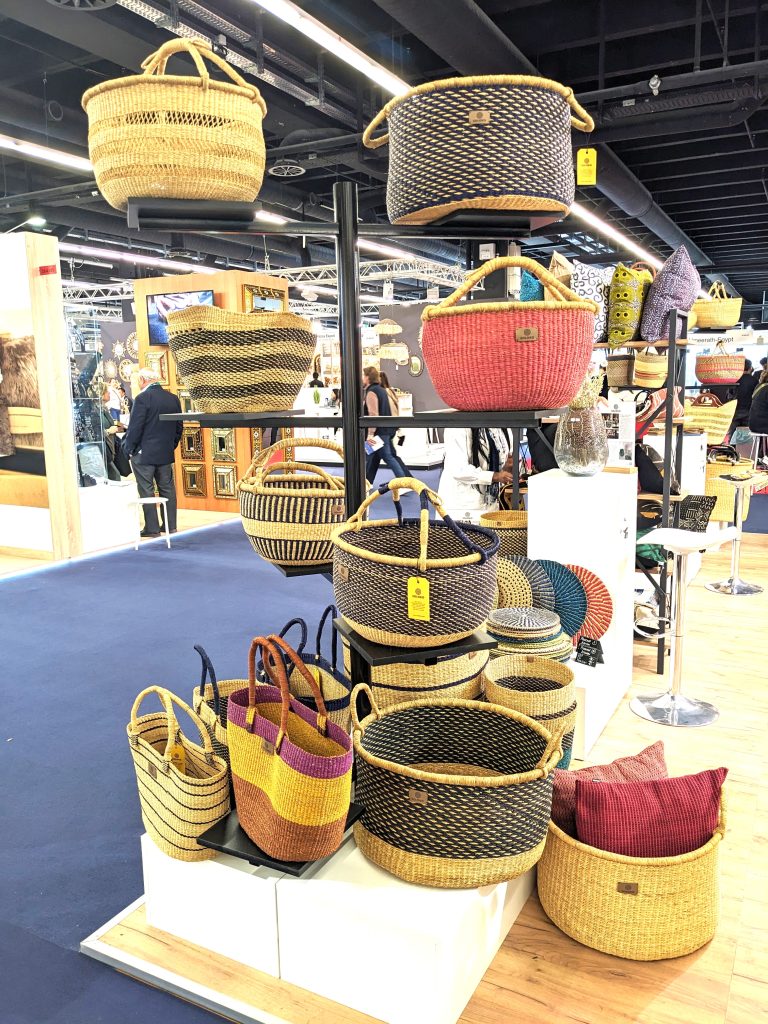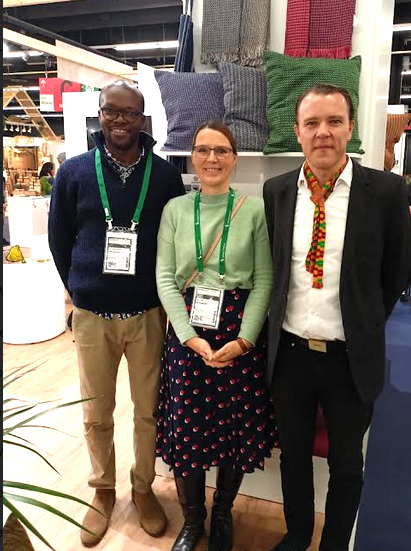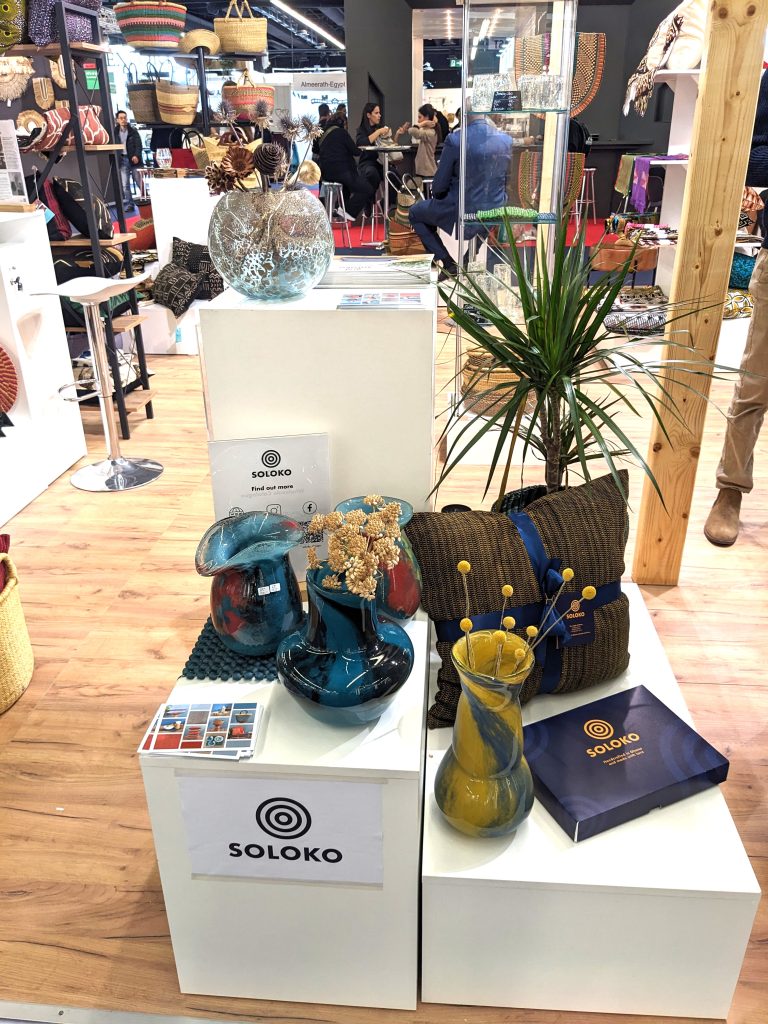
Handwoven products by SOLOKO at Ambiente international trade fair in Frankfurt, Germany/Photo: ANA/Niels Bartels
Frankfurt-am-Main, 28 January 2024
The trade show “Ambiente“ in Frankfurt is an international consumer goods trade fair.
The event showcases a great diversity of products for different living spaces and style directions. Ambiente covers the whole world of consumer goods: Dining, Living and Giving products. In addition, the trade fair is the main marketplace for products fulfilling sustainable criteria.
Ambiente opens up many possibilities by defining tomorrow’s major themes: Sustainability, Lifestyle and Design, Future Retail and Digital Expansion of Trade.
The event was fully booked, more than 4,500 exhibitors presented trends and innovations on an area of over 360,000 gross square meters.
AfricaNewsAnalysis’ Travel editor, Niels Bartels, attended the event and met up with the Ghanaian exhibitor SOLOKO. He interviewed their founders Antje Schubert and Patrick Kofi Avumegah.

ANA’s Travel editor, Niels Bartels (right) pictured with SOLOKO founders Patrick Avumegah (left) and Antje Schubert (middle)/Photo: ANA/Niels Bartels
Niels: How did you start SOLOKO ?
Antje: SOLOKO started actually four years back, so it’s been a while now, the start of our journey. We started in the Volta region in the Eastern part of Ghana. It all started with myself coming to Ghana actually to get myself involved in some social impact projects which I did together with Patrick and that is where all the story came up and established. I recognized the beauty of handcrafted products and the beauty of handicraft, especially the handwoven textiles. That caught my interest. I quickly realized I want to do something which has to do with the local artisans and bringing that out to the world. I wanted to modernize it without losing the traditional technique behind it and also without losing the tradition which lies in Ghanaian history when it comes to handicraft.
Niels: What is the meaning of SOLOKO?
Antje: It is a word creation of the place where the entire idea for SOLOKO came up. It’s an area which belongs to Ho which is the capital city of the Volta region. The name of the village there is Sokode Lokoe. By using this village we created SOLOKO. It is rooted in the geographic area where the idea for SOLOKO came up.
Niels: What is the link between SOLOKO products and Ewe culture of the Volta region in Ghana?
Patrick: The Ewe culture is very rich in the Kente fabrics. It is actually a product of the Ewe origin. It is a craft that they brought with them from Egypt when they migrated from Egypt all the way to Nigeria. It is a traditional craft of weaving that they brought with them. Some of the designs you can only find in the Volta region. That is the base for what we do.
Niels: How can you have a positive impact on the economy of that area and how can you empower women in that area?
Antje: This is the approach of our business. What we do is we work very closely with all the artisans we are working with, not only in the way that we are just letting them weave and do things for us. We invest into their set up and we train them. We also make sure in case there are some needs to change the loom. We invested into improving certain production set ups that allows them not only to produce for us (for SOLOKO) but also to produce other products for other customers.
We are enlarging and enriching their capacity. That will hopefully make it possible for them to do better business, not only with us but also for other customers.
We want to make sure that their likelihood is improved by working with us.
Patrick: In the volta region, from the south all the way to the northern part is a traditional craft. By the time you are 10 years old you should know how to weave. That was what was happening until when competition from imported textile products came in and then the industry came down.
As an impact from SOLOKO, if we are reviving the handicraft sector, then there is a likelihood that almost every household is going to benefit because most people learn this as a traditional craft. So SOLOKO is trying to create a ready market for the product and we modernize it so that it is attractive to Europe and American market then it means that anybody (women, children, elderly) who are into weaving or production of handicraft they have the opportunity to sell products and make money out of it which creates likelihood. That’s the main impact of the business apart from preserving the cultural heritage of the designs.

Handwoven products by SOLOKO at Ambiente international trade fair in Frankfurt, Germany/Photo: ANA/Niels Bartels
Niels: Let’s as well talk about the trade fair Ambiente. How did the visitors react to your products so far ? Is there kind of a “best selling“ product?
Antje: Since our product range is looking into different handicraft areas, textile is very strong in our collection. We get very positive feedback especially the people are attracted by the patterns so that’s what we hoped for and also the colour combinations.
We also have some fans who are looking into the mouth blown glass products. We are working with recycled glass, still mouth blown and hand made. It’s hard to say one product. It’s more like different customers having different preferences but the feedback is very good and we are very happy about that. We had some very good conversations with people from around the world. That is also nice to see that it attracts not only the European market. We had many conversations with people from Brazil, US, Canada and Japan. Japanese seem to like our products.
Patrick: There were also a lot of reactions from Italians on the colour. It’s a positive feedback When you produce something and the people say “It’s beautiful, the quality is high“ then you know that you have a good product.
Niels: Thank you for this interview and all the best for the remaining days of the event.
